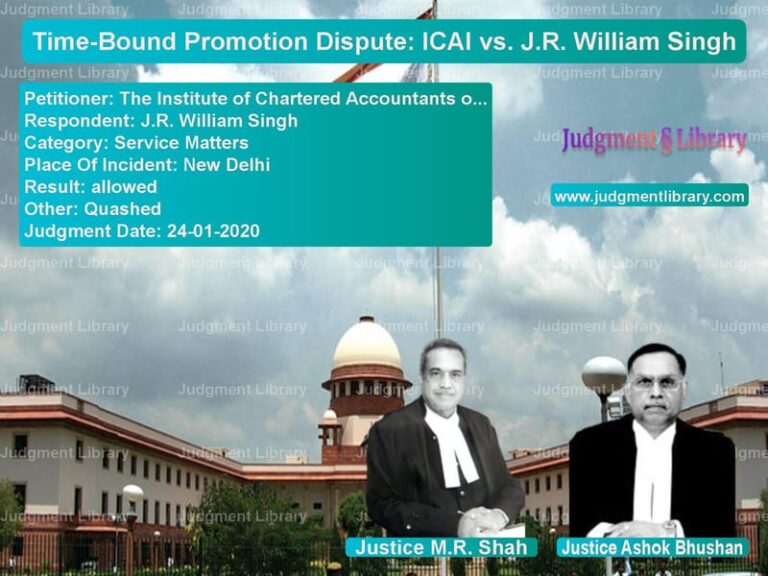Supreme Court Reinstates FIR in Attempt to Murder Case Despite Compromise
The Supreme Court of India in Criminal Appeal No. 446 of 2016 ruled on the quashing of an FIR under Section 307/34 IPC. The case involved the State of Madhya Pradesh (Appellant) and Rajveer Singh & Others (Respondents). The dispute arose after the Madhya Pradesh High Court quashed the FIR filed against Rajveer Singh, an Assistant Sub-Inspector, for allegedly shooting the complainant, Hakim Singh Rawat. The State challenged this decision, leading to the Supreme Court’s intervention.
Background of the Case
The complainant, Hakim Singh Rawat, lodged an FIR on April 3, 2006, alleging that the respondent, Rajveer Singh, along with other police officers, intercepted him and fired a gunshot at his leg, causing serious injuries. He further alleged that the officers physically assaulted him and delayed medical attention. Despite his efforts, no FIR was initially registered. The matter escalated when the Madhya Pradesh High Court ordered an investigation, resulting in the registration of a case on July 2, 2011.
Petitioner’s Arguments
The State of Madhya Pradesh contended:
- The High Court erred in quashing an FIR that disclosed a cognizable offense under Section 307/34 IPC (attempt to murder).
- The case involved serious allegations against a police officer, making it imperative for the investigation to proceed.
- Compromise between the complainant and the accused could not justify quashing an FIR in a case involving public policy and criminal justice.
- The High Court failed to consider that the FIR was registered following its own directions.
Respondents’ Arguments
Rajveer Singh, the accused officer, argued:
- The complainant had suffered injuries due to crossfire initiated by dacoits, not due to police action.
- There was a settlement between him and the complainant, warranting the quashing of criminal proceedings.
- The FIR was registered years after the alleged incident, indicating a lack of immediate grievance.
Judgment
The Supreme Court overturned the High Court’s decision, emphasizing that crimes affecting public safety cannot be nullified through compromise. The Court stated:
“We are not prepared to say that the crime alleged to have been committed by the accused persons was a crime against an individual, on the other hand, it was a crime against the society at large. Criminal law is designed as a mechanism for achieving social control and its purpose is the regulation of conduct and activities within society.”
Additionally, the Court reaffirmed its stance from State of Rajasthan v. Shambhu Kewat (2013), where it held that serious offenses, especially those under Section 307 IPC, should not be quashed due to private settlements.
Key Takeaways
- Serious criminal cases, such as attempt to murder, cannot be quashed merely on the basis of compromise between parties.
- The role of public policy in criminal law ensures that grave offenses undergo proper investigation and adjudication.
- The judgment reinforces the principle that FIRs should not be quashed in cases involving public interest and social order.
This ruling strengthens the accountability of law enforcement officers and ensures that serious allegations are thoroughly investigated.
Don’t miss out on the full details! Download the complete judgment in PDF format below and gain valuable insights instantly!
Download Judgment: State of Madhya Prad vs Rajveer Singh & Othe Supreme Court of India Judgment Dated 25-04-2016-1741854756863.pdf
Direct Downlaod Judgment: Direct downlaod this Judgment
See all petitions in Attempt to Murder Cases
See all petitions in Custodial Deaths and Police Misconduct
See all petitions in Judgment by Arun Mishra
See all petitions in Judgment by V. Gopala Gowda
See all petitions in allowed
See all petitions in supreme court of India judgments April 2016
See all petitions in 2016 judgments
See all posts in Criminal Cases Category
See all allowed petitions in Criminal Cases Category
See all Dismissed petitions in Criminal Cases Category
See all partially allowed petitions in Criminal Cases Category







